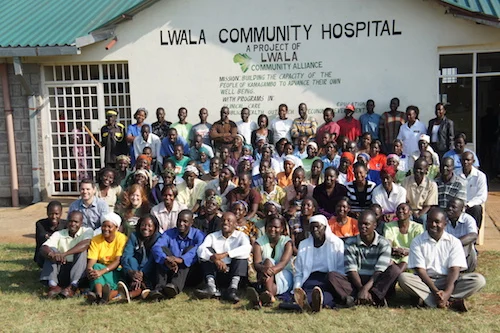 Infertility is a story of unrequited love. But God wrote that story. A parent who deeply desires a relationship with His children? Yeah. He gets that. He loves us. He desires to place all of His love squarely upon our heads. He is waiting for us to awaken to the truth, for us to take our first spiritual breath.
Infertility is a story of unrequited love. But God wrote that story. A parent who deeply desires a relationship with His children? Yeah. He gets that. He loves us. He desires to place all of His love squarely upon our heads. He is waiting for us to awaken to the truth, for us to take our first spiritual breath.
All in Truth
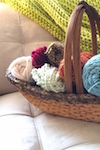 Every step merits intentionality and reevaluation. I have learned that a way to assess whether or not I have remained in rhythm while crocheting is to compare the row of stitches I have just finished to the foundational row with which I started. With every turn of the corner, I raise up the work and see if it is still in balance. If it is, I keep going. If it is not, I unravel just a few stitches back and adjust accordingly. This is how a blanket gets made, with ever-present intentionality.
Every step merits intentionality and reevaluation. I have learned that a way to assess whether or not I have remained in rhythm while crocheting is to compare the row of stitches I have just finished to the foundational row with which I started. With every turn of the corner, I raise up the work and see if it is still in balance. If it is, I keep going. If it is not, I unravel just a few stitches back and adjust accordingly. This is how a blanket gets made, with ever-present intentionality.
 We may ask ourselves, how are we Christ-imprinted? What is God calling us to do and be as we stand awed and fearful before some significantly burning bush? What needs to happen for us to receive some kind of stigmata — some signals that mark us as Christ’s own. Not, perhaps, the bloody wounds in the palms of the hands, but the pure, open, joyful, and contrite heart that God has promised to claim for Himself, to not despise, and to count as more valuable to Him than any human accomplishment and success.
We may ask ourselves, how are we Christ-imprinted? What is God calling us to do and be as we stand awed and fearful before some significantly burning bush? What needs to happen for us to receive some kind of stigmata — some signals that mark us as Christ’s own. Not, perhaps, the bloody wounds in the palms of the hands, but the pure, open, joyful, and contrite heart that God has promised to claim for Himself, to not despise, and to count as more valuable to Him than any human accomplishment and success.
 A hammock of flimsy web that should rip apart, but doesn’t. A hammock anchored to thin twigs that should break, but don’t. You climb in and hope it holds. I like to wonder about the nature of all this unseen support that offers not only the safety of the curl but the strength of the swing. I imagine the catch of angels; God’s infinite palm; the unknowable, immeasurable, yet nevertheless concrete woof and warp of divine will and presence.
A hammock of flimsy web that should rip apart, but doesn’t. A hammock anchored to thin twigs that should break, but don’t. You climb in and hope it holds. I like to wonder about the nature of all this unseen support that offers not only the safety of the curl but the strength of the swing. I imagine the catch of angels; God’s infinite palm; the unknowable, immeasurable, yet nevertheless concrete woof and warp of divine will and presence.
Then I look around.
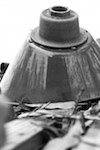 Nearly every step of the slow DIY building project was a step-by-step trial by fire for me. Though untrained and in anti-possession of any legitimate carpentry skills, the one trait I have going for me is that, though slow, I am a willing student. When someone reacts in response to seeing my now complete dwelling, You are so handy. I could never do that, my inner, if not verbal, response is, I have no idea what I am doing. If I can do this, anybody can. And I absolutely mean it.
Nearly every step of the slow DIY building project was a step-by-step trial by fire for me. Though untrained and in anti-possession of any legitimate carpentry skills, the one trait I have going for me is that, though slow, I am a willing student. When someone reacts in response to seeing my now complete dwelling, You are so handy. I could never do that, my inner, if not verbal, response is, I have no idea what I am doing. If I can do this, anybody can. And I absolutely mean it.
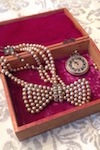 As I interact with children of every age, I am convinced the one common thread to maintaining a child’s natural curiosity is that we allow them to be explorers. And most of the time, exploration looks like play. Play remains the most valuable learning tool children use, and they never tire of it. As children play, they collaborate, problem-solve, wonder, discover, risk failure and learn to persevere.
As I interact with children of every age, I am convinced the one common thread to maintaining a child’s natural curiosity is that we allow them to be explorers. And most of the time, exploration looks like play. Play remains the most valuable learning tool children use, and they never tire of it. As children play, they collaborate, problem-solve, wonder, discover, risk failure and learn to persevere.
The Ritual of Returning (to Kenya)
As much as I miss the surety of my childhood idea of home, I am grateful for the tension that stretches me between two continents. I am drawn back not as an explorer or safari gazer who longs for Africa in the naïve and ideal sense, but because I love what Africa has become for us — a place where we belong, a kind of home. And I know that some day when this ritual of returning to Kenya becomes less regular, I will be homesick.
Conversations About Race
Eight years ago, the life paths of three women — one black, one white, one multi-racial — crossed, and a unique friendship was born. The topic of race was central from the inception, and we shared a fundamental sense that we needed one another as we explored the terrain of race. Despite the fact that many of our conversations over the years have been difficult and sensitive, they’ve also been beautiful.
 I do not remember what I said to my mother over the phone, or what Ms. Reed said when I came back to class. What I remember is staring at my desk, the florescent light blurring into a seamless expanse over me, a pencil shaking in my hand. What I remember is the way my mother walked into the office, wordless, a pink sweatshirt bunched between her hands. My mother’s lips were bare and pale, and the sweatshirt hung past my knees.
I do not remember what I said to my mother over the phone, or what Ms. Reed said when I came back to class. What I remember is staring at my desk, the florescent light blurring into a seamless expanse over me, a pencil shaking in my hand. What I remember is the way my mother walked into the office, wordless, a pink sweatshirt bunched between her hands. My mother’s lips were bare and pale, and the sweatshirt hung past my knees.
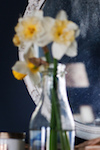 In so many ways, my ideal home is like the earth itself. Perhaps that is the real reason I eschew plastic and acrylic. Perhaps that is why I love wood and wool. Why I like to see our rooms change with the seasons. I want to remember that I am made from the stuff of earth. I never want to forget that the earth is my God-made home. The sky a tent overhead.
In so many ways, my ideal home is like the earth itself. Perhaps that is the real reason I eschew plastic and acrylic. Perhaps that is why I love wood and wool. Why I like to see our rooms change with the seasons. I want to remember that I am made from the stuff of earth. I never want to forget that the earth is my God-made home. The sky a tent overhead.
 I sit for a moment in the reality of my own fortune, my own comfort, my own deep-seated needs and self centered nature. I remember the ashes, the feel of them on my forehead, gritty under Father Boyle’s thumb as he pressed them into the sign of the cross and I breathe then, one deep breath, one heavy sigh that releases shame of that milk carton moment, that column of ash moment, that slow march toward Good Friday. Carus, we are Easter people.
I sit for a moment in the reality of my own fortune, my own comfort, my own deep-seated needs and self centered nature. I remember the ashes, the feel of them on my forehead, gritty under Father Boyle’s thumb as he pressed them into the sign of the cross and I breathe then, one deep breath, one heavy sigh that releases shame of that milk carton moment, that column of ash moment, that slow march toward Good Friday. Carus, we are Easter people.
 In my writing about my friend, I embellished certain details. I filled in the holes. And as a result, if I’m honest, I’m not sure which parts of the story are true, as in truly happened, and which parts I’ve added, piece by piece, over the years. Was it my need to remember that built this parallel between his eyes and the radio? Did we really smoke pot on a park bench, en plein air, as I’ve so often recalled, or was it cigarettes? Did he hold my hand during the movie we watched together, or did I dream that, too?
In my writing about my friend, I embellished certain details. I filled in the holes. And as a result, if I’m honest, I’m not sure which parts of the story are true, as in truly happened, and which parts I’ve added, piece by piece, over the years. Was it my need to remember that built this parallel between his eyes and the radio? Did we really smoke pot on a park bench, en plein air, as I’ve so often recalled, or was it cigarettes? Did he hold my hand during the movie we watched together, or did I dream that, too?
The Mother & Child Project
The role of the artist in society is unique. Unlike bankers, teachers, police officers, senators, doctors, or professors, artists stand at the margins of society and write poetry and prose rife with metaphor and images as a kind of prophetic voice, hopefully with a vision of truth and love. This vision can empower community, uplifting the vulnerable, and provide a newfound hope for a better life for all. The artist has the power to bend language to her will to get “between the lines” of poetry to allow what the Bible calls “true religion” to emerge. With this perspective, there is beauty, clarity, and pure advocacy.
1,000 Days
Never mind that this child is in a different country than the one for which we have been approved. Never mind that moving forward with this child will mean redoing much of our paperwork, once again driving around to banks, doctor’s offices, police departments, and myriad government buildings to get new documents printed, notarized, and certified. My friend Jill has a song that sings, “And then out of nothing, it’s telling me something I didn’t know that I knew.” There is a mysterious kind of knowing that can happen to a person, and it seems all the more sweet and supernatural when it comes to your life partner in the same time and space.
 So, this winter, I’m finding it worthwhile — even necessary — to name the things that are saving my life. Sometimes I scribble down a list in my journal (a gift from my sister last Christmas, and itself a lifesaver). Sometimes I take the time to write a blog post, with pictures of those purple tulips or a brave blue winter sky. Most often, I’m trading daily texts with my friend Laura, both of us doing our best to find and name the things that are saving our lives. The act of naming them often becomes a lifesaver, a welcome glimpse into the brighter side of this world.
So, this winter, I’m finding it worthwhile — even necessary — to name the things that are saving my life. Sometimes I scribble down a list in my journal (a gift from my sister last Christmas, and itself a lifesaver). Sometimes I take the time to write a blog post, with pictures of those purple tulips or a brave blue winter sky. Most often, I’m trading daily texts with my friend Laura, both of us doing our best to find and name the things that are saving our lives. The act of naming them often becomes a lifesaver, a welcome glimpse into the brighter side of this world.
 When I was a child, I lived in fear. Now that I’m a man, I’m learning — slowly, it sometimes seems — how to act out of love; love for my friend, love for my neighbor, love for myself. Love grounded in particulars, freed from the burden of empty rhetoric. Love that honors the dignity and complexity of every person I meet.
When I was a child, I lived in fear. Now that I’m a man, I’m learning — slowly, it sometimes seems — how to act out of love; love for my friend, love for my neighbor, love for myself. Love grounded in particulars, freed from the burden of empty rhetoric. Love that honors the dignity and complexity of every person I meet.
 I have, in other words, no desire to go back in history. But I do yearn to see trees with greater clarity. I want to see them as my fellow creatures, called into existence by God, with a dignity and significance all their own. I want to realize that at the creation they were made to be trees, for God’s glory, and they have done so — it is my race of creatures that refuses to abide by God’s word. I want to know more about chlorophyll and cambium layers and see in them glimpses of glory that shine with hints of a transcendent power beyond my knowing.
I have, in other words, no desire to go back in history. But I do yearn to see trees with greater clarity. I want to see them as my fellow creatures, called into existence by God, with a dignity and significance all their own. I want to realize that at the creation they were made to be trees, for God’s glory, and they have done so — it is my race of creatures that refuses to abide by God’s word. I want to know more about chlorophyll and cambium layers and see in them glimpses of glory that shine with hints of a transcendent power beyond my knowing.
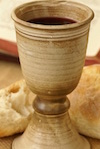 We didn't totally understand what Communion was. At least I didn’t. If it was magical to the Catholics, literally becoming body, and blood, and meaningless to atheists, a bizarre religious ritual, I suppose I fell somewhere in between. We read no books about Communion, took no classes to prepare, made no declarations of faith besides the act itself. Now I see the act is its own declaration, its own remembrance. But I didn't know then.
We didn't totally understand what Communion was. At least I didn’t. If it was magical to the Catholics, literally becoming body, and blood, and meaningless to atheists, a bizarre religious ritual, I suppose I fell somewhere in between. We read no books about Communion, took no classes to prepare, made no declarations of faith besides the act itself. Now I see the act is its own declaration, its own remembrance. But I didn't know then.
Seldom Suppress a Generous Impulse
When I was young, it struck me as strange that my father enjoyed giving so much, but years later, I am finally beginning to understand. He has become so accustomed to the thrill of working alongside his heavenly father to care for the needs of others that temporal goods have lost hold on his affections. As the earthly tent wears thin, he sees with ever increasing clarity the bountiful riches of God’s economy. One day, I hope that I will see it too.
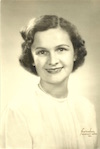 . . . so much of what Doll taught me had to do with working around missteps — my own, and others’ — with flexibility and grace. And, posthumously, that she’s redefined the meaning of hospitality for me, so that I think of it not only in its traditional sense, but also in the day-to-day as I “host” my children, their friends, my husband, and our friends and family. Doll cared for and catered to her guests. She hoped to spoil them with the best of what she had to offer — a thing that, when translated, came down to great love and a capacity to supply equal amounts of comfort and whimsy.
. . . so much of what Doll taught me had to do with working around missteps — my own, and others’ — with flexibility and grace. And, posthumously, that she’s redefined the meaning of hospitality for me, so that I think of it not only in its traditional sense, but also in the day-to-day as I “host” my children, their friends, my husband, and our friends and family. Doll cared for and catered to her guests. She hoped to spoil them with the best of what she had to offer — a thing that, when translated, came down to great love and a capacity to supply equal amounts of comfort and whimsy.















